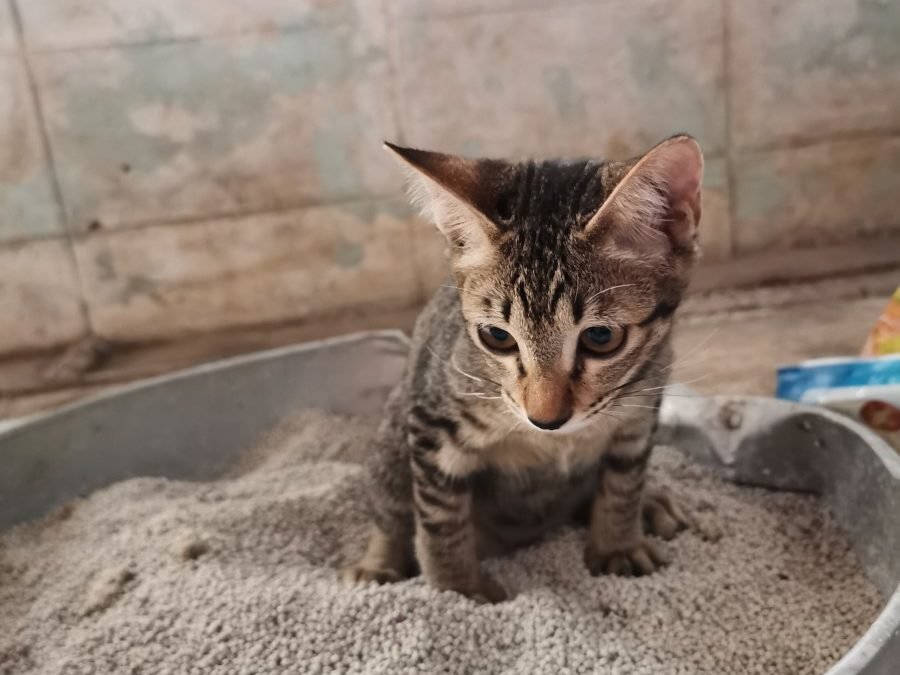If you just brought your new kitten home and are you’re wondering: “how do I litterbox train a kitten?”, you’ve come to the right place.
The good news about litter box training kittens is that even new kittens are generally easy to train to use a litter box. If you get a kitten from someone who has the mother on the premises it is a no-brainer as the Momma Cat does show the kitten and models the behavior.
Even if you do not get a kitten from a breeder or pet store, rescues do train them also. However, even if you find one feral outside, litter training is easy, as all cats and kittens are genetically programmed to “hide” their treasures (doody).
It is natural even among wild cats who will bury their droppings in the dirt, sand, etc.
Mammals of all types are different with their defecation preferences as a rule. Horses and other four-legged mammals can just “drop as they drop” whereas cats must bury, and dogs always try to cover with grass, etc.
Problems Can Occur but You Can Prevent These
First off, never put your new kitten’s food and water bowl next to the litter box. Cats do not like to eat and drink close to where they defecate.
In addition, starting with unscented litter is best as cats and especially kittens are sensitive to smell, and new smells can intimidate them.
You might need to try a few varieties of litter to get one your kitten likes and try many types of litter boxes if accidents keep occurring.
Eventually, you will find the perfect combination of litter and litter box. There are even some kittens who prefer an aluminum pan to a plastic box, or even cardboard disposable boxes.
Covered litter boxes might be too intimidating for a new kitten. It can seem dark and scary in there for them. If you have more than one cat, a new kitten will need a separate litter box as the original cat or cats can become territorial and not allow the kitten to use the box (of course this will happen when you are NOT looking).
Steps in the Process of Litter Training
- As soon as you bring your kitten home introduce them to the litter box and place them in it gently. Chances are after a trip they are anxious and need to “go”!
- Have toys and treats on hand. Give a toy or treat each time your kitten uses the box.
- If accidents happen outside the box, clean up immediately and use an enzyme disinfectant to dispel the smell or your kitten will keep going in that same spot.
- Once the litter box is used, clean up all pee and poop immediately. Once a day make sure to change the box entirely, and again use some type of disinfectant, even if it’s only soap and water. Never use bleach or harsh chemicals as your kitten will lick their paws and can become ill.
- Praise, praise, and more praise. Once they go be sure and praise them each time. Cats, especially kittens love praise.
- Do not ever punish or scold for accidents. This will only make your kitten associate bad events with going to the bathroom.
- Ensure you check the litter box after eating and scoop any poop or pee. After eating is when many kittens and cats generally head straight for the litter box.
- Put the litter box in a private place. No one, not even cats enjoy going while being in public.
- Keep any children away from the litter box while the kitten is in it. Kittens and cats are sensitive, and children find their use of the litter box hilarious. A kitten will develop a sense of shame and start doing its duty in places such as behind the couch, etc. If you do not provide privacy, they will find it!
- Spay or neuter as soon as possible. Male cats spray and unneutered females also mark territory especially if there are other cats in your home.
Inconsistencies Will Exist at First
Like training a puppy or even a toddler, potty training takes patience, and training a kitten to use the litterbox is the same!
Some days will be good, and others are not so good. There will be backsliding at times. Kittens are getting used to your new environment and all new experiences in life.
They need time and patience to adjust. While it can be frustrating at times, following the above guidelines will help, and as your kitten grows older the accidents become fewer.
Show love and patience and reinforcement. Each time your kitten starts squatting pick it up gently and place it inside the litter box. Being as intelligent as cats are, your kitten will soon learn to use the box without your help at all.
If you prefer to watch a video, please check out his excellent video by Kitten Lady.

Jonathon Hyjek is an entrepreneur and cat-lover. He is married to Joy and they share their home with their 2 feline-friends, Franklin & Ollie. Jonathon is a self-admitted “Crazy Cat Guy”. He started this website because of his love for his own cats and their well-being.

